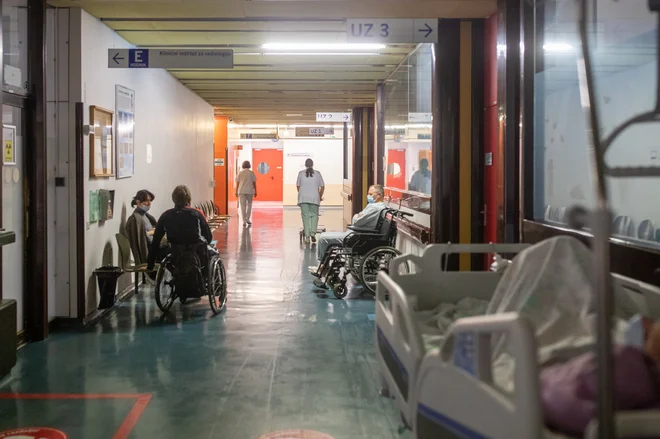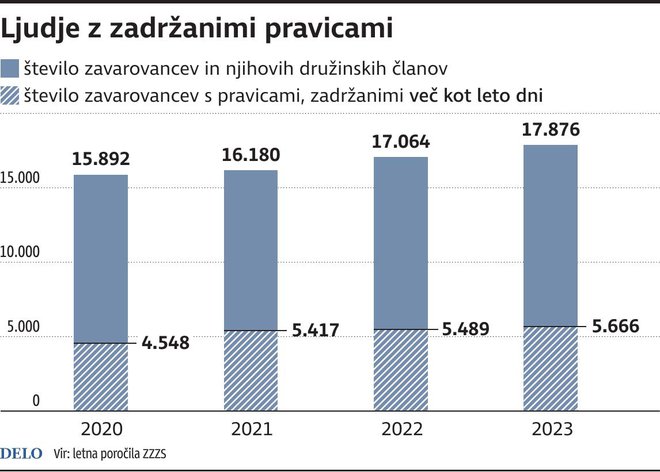
- Četrtek, 3. julij 2025
- Delo home
-
Neomejen dostop | že od 14,99€
More and More People Without Health Insurance Rights

If you are not a regular payer of health insurance contributions and owe 177.68 euros, your rights under mandatory health insurance (OZZ) will be suspended. The number of debtors who therefore cannot see a doctor unless it is urgent or they pay for it themselves has been increasing in recent years. Among them are also cases of people whose rights have been unjustly suspended.
The institute of suspension of rights for irregular payers of contributions is prescribed by the Health Care and Health Insurance Act (ZZVZZ) and must be implemented by the Health Insurance Institute of Slovenia (ZZZS). Rights are suspended for insured persons if the amount of unpaid obligations from mandatory health insurance contributions exceeds eight percent of the average monthly gross salary for the previous year (for last year and the first two months of this year, this limit was 161.91 euros, from March this year it is 177.68 euros). ZZZS issues notices of suspension of rights based on the Act on Intervention Measures in the Field of Health, Labor, and Social Affairs and health-related content (ZIUZDS).
Last year, there were almost two thousand more people who were issued these notices than in 2020. The number of insured persons whose rights were suspended for more than a year also increased during this period, specifically by 1118. The largest share of irregular payers whose rights are suspended are self-payers of contributions (persons without regular income who are insured under point 20 of Article 15 of ZZVZZ), followed by self-employed individuals.
Insured persons with suspended rights can only claim the right to emergency medical assistance and urgent treatment under mandatory insurance.

Notice Without Legal Instruction
Among the persons whose rights under OZZ are suspended, there are also those for whom this should not happen. According to a ruling by the Ljubljana Labor and Social Court, which is not yet final, the rights were unjustly suspended for a husband who is included in the insurance as a spouse – through his employed wife. His rights were suspended this year because he had a debt from unpaid contributions from several years ago and from his previous insurance (as a self-employed person, he was left without funds because he did not receive payment for the work done). However, since his wife does not have a debt from the new mandatory health contribution, his rights should not be suspended according to the court's ruling.
We asked attorney Zlata Kojić from the Law Office of Nina Cek, who represented the mentioned husband, what people should pay attention to in such cases. Kojić pointed out that for the "little person," the problem arises already upon receiving the notice of suspension, as it does not contain legal instruction that it is possible to seek any legal protection against such a decision (appeal to ZZZS or lawsuit to the Labor and Social Court). They also had a problem with seeking judicial protection because the lawsuit was initially dismissed with the explanation that the ZZZS notice of suspension of rights cannot be considered a final decision in the sense that it could be challenged in a social court dispute. They only succeeded with an appeal.
Kojić also mentioned that their client's request for free legal aid was initially rejected because the court deciding on it explained that the client does not have access to judicial protection.
According to her, the matter is also interesting from a substantive point of view. In her opinion, the legal provision under which notices of suspension of rights are issued is excessively restrictive. "The right to health care from mandatory health insurance is one of the fundamental human rights protected at the constitutional level. The current regulation de facto excludes individual insured persons from the mandatory health insurance system, and the purpose pursued is very punitive in nature. Those who cannot pay their debt from unpaid contributions are punished. If the insured had the means to pay their debts, the state could already seize them within the framework of tax enforcement. If this was not successful, it is very likely that the insured does not have the means to pay the debt. Therefore, it is unacceptable to punish such insured persons further by excluding them from the health system," the attorney is clear.
According to her, informal data show that there are no disputes in such matters, "which further supports the thesis that insured persons do not even know how to act in such cases." She believes that insured persons must be informed that the current regulation is problematic from a constitutional perspective and that if they are affected by such consequences, they can seek legal protection. It should be noted that from the above-described case, no final conclusion about the unconstitutionality of the current legal regulation was reached, as the court granted the lawsuit on another legal basis.
Inappropriate and Disproportionate Measure
Will ZZZS appeal? The deadline for the appeal is November 6, and the decision will consider the court ruling, which shows that the Ministry of Health's explanation from 2015, that the debt from previous insurances is also considered as the debtor's debt, is incorrect and not acceptable in the specific case. If the first-instance ruling stands, ZZZS will have to reimburse the plaintiff's legal costs.
The institute believes that the suspension of rights should be excluded from mandatory health insurance – that is, Article 78.a of ZZVZZ should be deleted. Similar to Kojić, they assess that restricting access to health rights for insured persons due to debt is not an appropriate and proportionate measure. ZZZS proposed this option to the Ministry of Health and the National Assembly already during the preparation of the Health Care and Health Insurance Act in 2017, again during the preparation of ZZVZZ-T in 2023 (upon the abolition of supplementary health insurance and the introduction of mandatory health contribution), and also during the preparation of the intervention law – ZIUZDS in 2023. "The abolition of the institute of suspension of rights would be a very important change in ensuring the universality of insurance and access to rights," they are convinced at the institute.

 V živo:
V živo:
Komentarji